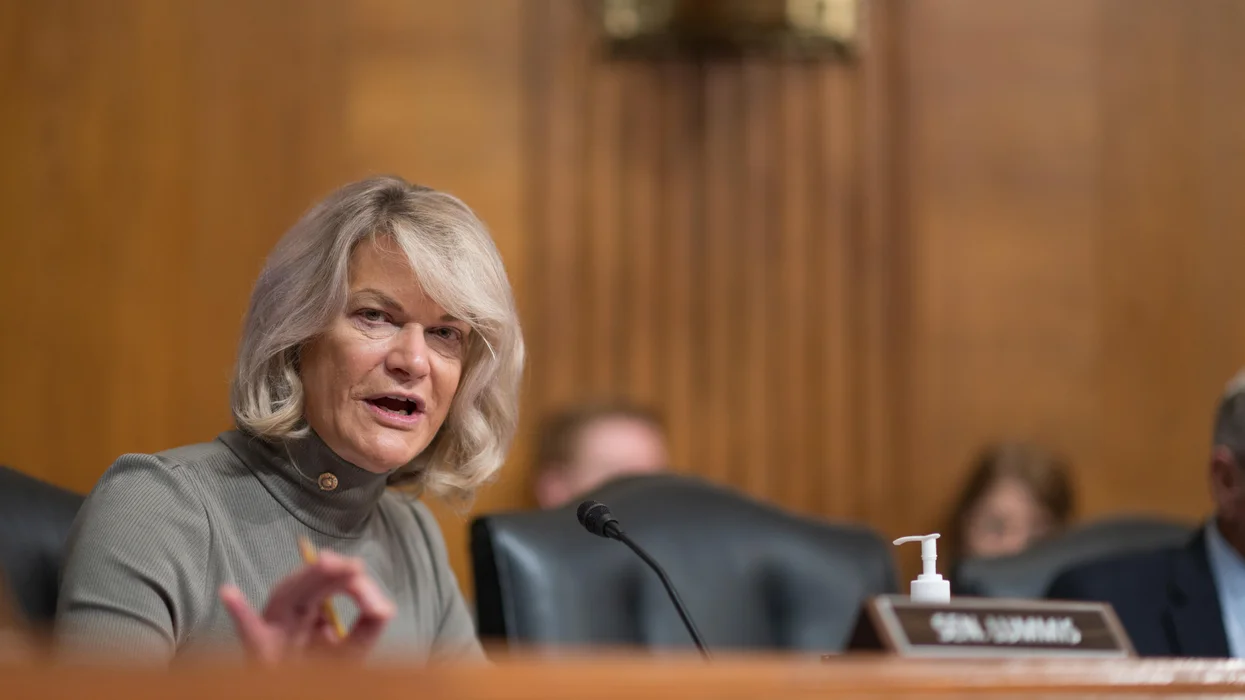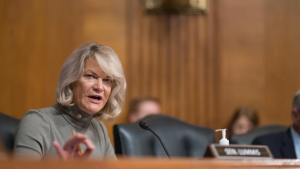Join Our Telegram channel to stay up to date on breaking news coverage
Senator Cynthia M. Lummis of Wyoming called for the dismissal of the U.S. Securities and Exchange Commission’s (SEC) lawsuit against cryptocurrency exchange Coinbase, arguing it conflicts with legislative efforts.
Senator Lummis, a crypto asset policy leader and member of the Senate Committee on Banking, Housing, and Urban Affairs, also argued in an amicus curiae brief that the SEC’s regulatory stance even intrudes on the separation of powers established by the Constitution.
Lummis said:
Crypto asset regulation is a Congressional priority and momentum currently exists toward the passage of a balanced framework that promotes responsible innovation and protects consumers.
Central to the argument is the question of regulatory authority over crypto assets. Congress is actively deliberating on multiple bills that address the classification and regulation of crypto assets. These bills recognize the complex nature of the industry and advocate for a comprehensive approach that goes beyond the scope of a single agency.
Lummis highlights that while the SEC is an important stakeholder, its view of crypto assets as securities conflicts with most of the pending legislative proposals. She argued:
The SEC’s assertion of authority in this case is out of step with active legislative efforts. Congress has introduced various bills to address the role of various federal agencies in the regulation of crypto assets.
The bills in Congress recognize that the crypto industry doesn’t neatly fit within existing securities laws and requires a tailored framework. They delineate the roles of various agencies, such as the SEC and the U.S. Commodity Futures Trading Commission (CFTC), in regulating different aspects of the crypto ecosystem.
Lummis, along with Senator Kirsten Gillibrand of New York, recently introduced the bipartisan Lummis-Gillibrand Responsible Financial Innovation Act, a comprehensive piece of legislation addressing crypto asset regulation.
SEC Is Encroaching on Congress’s Role
Lummis contends that the SEC’s attempt to expand its authority through enforcement actions contradicts the separation of powers enshrined in the constitution. The SEC’s enforcement stance, treating crypto assets as securities, departs from the traditional definition of “securities” established by Congress. This expansion of authority runs counter to the role assigned to Congress to legislate on matters of economic and political significance.
The argument further highlights that the SEC’s novel interpretation of its authority violates the principle of separation of powers. Senator Lummis asserts that the SEC cannot unilaterally redefine the classification of crypto assets without clear congressional authorization. This move encroaches on Congress’s role and policymaking authority in shaping the regulatory landscape for the emerging crypto industry.
She said:
Whether dubbed ‘the major questions doctrine’ or basic preservation of the separation of powers, Congress has not conferred on the SEC wholesale regulatory power over this industry, and accepting the SEC’s theory encroaches on Congress’s legislative role.
Balancing Regulatory Framework vs. Enforcement Action
The core message of Senator Lummis is that the determination of a regulatory authority for crypto assets rests with Congress. The cryptocurrency industry’s complexities require a comprehensive and well-considered framework that takes into account a range of interests and perspectives. Congress is better suited to making major policy decisions that balance economic factors and trade-offs while ensuring consumer protection and responsible innovation.
As the courts deliberate on the SEC’s action against Coinbase, the question of regulatory authority remains pivotal. Senator Lummis injects a significant voice into the ongoing legal battle between Coinbase and the SEC. It emphasizes the necessity of a clear and comprehensive regulatory framework that recognizes the unique characteristics of the crypto industry.
By advocating for the separation of powers and upholding the authority of Congress, Senator Lummis highlights the importance of democratic decision-making and balanced policy formulation in the evolving landscape of crypto asset regulation. Her intervention underscores the importance of maintaining the balance of powers and ensuring that the crypto industry’s regulatory framework is a product of comprehensive legislative efforts rather than unilateral agency actions.

Crypto and Tech Advocacy Groups Unite Against SEC
Echoing Senator Lumiss is a coalition of crypto and tech advocacy groups, which includes well-known names like the Blockchain Association, Crypto Council for Innovation, Consumer Technology Association, and the Chamber of Progress. Together, they submitted a joint amicus brief on Friday, with the shared goal of pushing for the dismissal of the lawsuit.
The organizations say the SEC is aiming for a significant expansion of its authority. This expansion involves gaining control over the trading of nearly all digital assets on secondary markets. The implications are substantial, as it wouldn’t just impact the trillion-dollar digital asset industry but also open the door to potential oversight over a wide range of other assets.
Other Related Articles
- Best Crypto to Buy Now – Top 15+ List
- Shiba Inu Surges 14% in a Week; Nears $25M and Announces Upcoming Staking
- Binance Seeks Protective Order Against SEC’s ‘Fishing Expedition’
Best Wallet - Diversify Your Crypto Portfolio
- Easy to Use, Feature-Driven Crypto Wallet
- Get Early Access to Upcoming Token ICOs
- Multi-Chain, Multi-Wallet, Non-Custodial
- Now On App Store, Google Play
- Stake To Earn Native Token $BEST
- 250,000+ Monthly Active Users
Join Our Telegram channel to stay up to date on breaking news coverage


